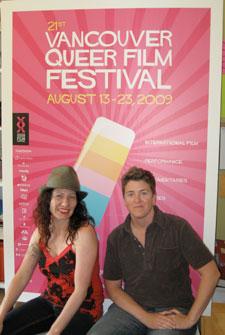Riding high off its 20th anniversary last year, the Vancouver Queer Film Festival (VQFF) — like anyone entering their 20s — is facing plenty of new changes and challenges as it prepares for its 21st year of programming, beginning Aug 13.
The VQFF has blossomed since it started as a series of flicks shown in a West End living room. Now it has evolved into an 11-day festival featuring 71 films from all over the world, and bringing together international and local filmmakers, writers, actors and artists.
Probably the most notable change over the last 12 months has been the addition of a new director of programming, replacing the departing Vanessa Kwan. Local performance artist and filmmaker Amber Dawn (Xtra West’s Hero of the Year in 2008) has stepped into the role.
“It’s feeling very much like a natural progression [to take on this role],” Dawn says. “I also have a not-for-profit background, mainly in sexual health in the gay community. I have that go-go-go, make-a-lot-happen-on-really-humble-resources-and-budget background,” she elaborates.
“I’ve been in the queer underground arts community for a long time. And it’s great, when I love a film or a book, I always try to recommend it to all my friends, and now I feel like I can recommend it to 300 friends, ‘cause that’s the capacity of the theatre,” she adds.
Under Dawn’s direction, this year’s festival has created two unique programming tracks for some of the featured films. One — Asian Voices — brings together queer Asian directors. The other, Focus on Hope, highlights documentaries about queer champions who inspire the community.
Additionally, a Speakers’ Cabana with local filmmaker Gwen Haworth (She’s A Boy I Knew) invites attendees to share their personal narratives with Haworth, which will then be screened randomly before films and put online in full. The festival will also feature performance art that promises to push lots of boundaries.
“I come from a performance background and having live performance happen within the festival is great,” Dawn says. “We’ve commissioned a collaboration, a sort of artistic mashup or learning exchange, if you will. We’ve brought together a Chinese shadow box puppeteer and burlesque dancer and just told them to make something together, which is turning out to be a narrative of a young woman’s wet dream.”
Moreover, the festival is further expanding its youth-accessible programming, featuring several films for those who are under 18. “We’re at 22 films this year, and were at 16 last year,” festival executive director Drew Dennis points out.
“We’re also having a special youth gala, a collaboration with Pride in Art.”
With audience surveys proving that the age range is now skewing younger (it used to be that most attendees were in their late 30s), it’s an important direction for the festival’s continued growth, particularly in the face of a global economic crunch that’s hurt most not-for-profits.
“It’s definitely been a challenging year for anybody within the non-profit sector, or any sector for that matter,” Dennis acknowledges. “Mostly, it’s the uncertainty of the economy that makes it difficult to plan with confidence. So far we’ve been very fortunate,” Dennis notes.
“We have a strong community of giving behind us, both with individual donors and corporate sponsors. We’ve had a small drop in sponsorships, but we’ve brought in new ones, so I think we’re weathering [the economic storm],” Dennis says.
“The one piece of funding we know will impact us is the BC Arts Council. The province cut their funding by half, so we’re probably looking at about a $10,000 drop for 2010,” Dennis reveals.
But the numbers are on the VQFF’s side. Attendance has gone up 53 percent over the last three years, and this year’s programming will find the festival taking up residency at Granville 7 theatre for six full days, almost doubling the seating capacity for many films.
“I think it’ll be exciting to bring some more queer activity to Granville St,” Dennis says. “Our trailer will be playing on the screen above Future Shop at Robson and Granville, so that’ll be queering things up a little bit.”
In a year that’s seen an apparent increase in gaybashings and attacks on the queer community, the festival’s message of hope, inspiration and tolerance couldn’t be more relevant.

 Why you can trust Xtra
Why you can trust Xtra


